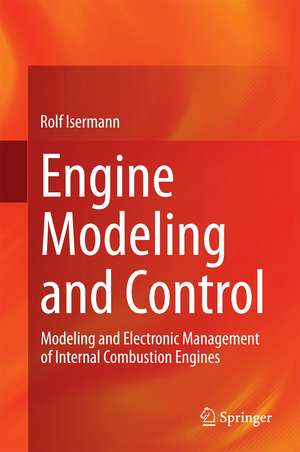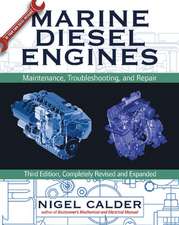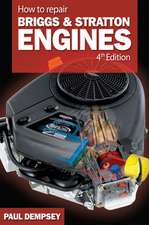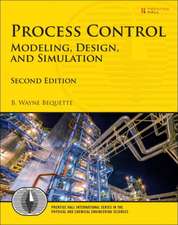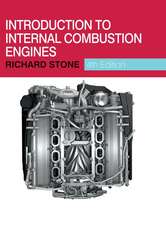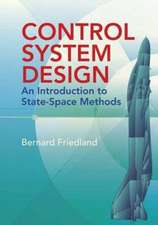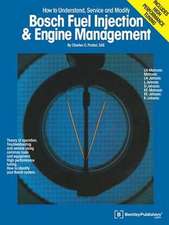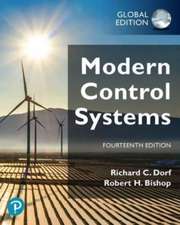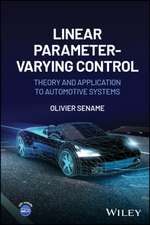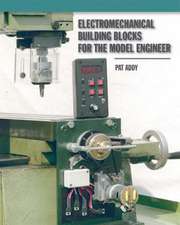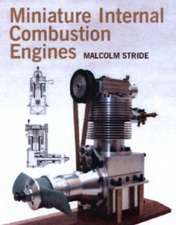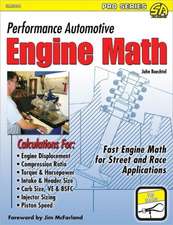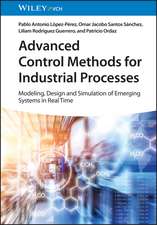Engine Modeling and Control: Modeling and Electronic Management of Internal Combustion Engines
Autor Rolf Isermannen Limba Engleză Hardback – 14 iul 2014
The book treats physically-based as well as models based experimentally on test benches for gasoline (spark ignition) and diesel (compression ignition) engines and uses them for the design of the different control functions. The main topics are:
- Development steps for engine control
- Stationary and dynamic experimental modeling
- Physical models of intake, combustion, mechanical system, turbocharger, exhaust, cooling, lubrication, drive train
- Engine control structures, hardware, software, actuators, sensors, fuel supply, injection system, camshaft
- Engine control methods, static and dynamic feedforward and feedback control, calibration and optimization, HiL, RCP, control software development
- Control of gasoline engines, control of air/fuel, ignition, knock, idle, coolant, adaptive control functions
- Control of diesel engines, combustion models, air flow and exhaust recirculation control, combustion-pressure-based control (HCCI), optimization of feedforward and feedback control, smoke limitation and emission control
This book is an introduction to electronic engine management with many practical examples, measurements and research results. It is aimed at advanced students of electrical, mechanical, mechatronic and control engineering and at practicing engineers in the field of combustion engine and automotive engineering.
| Toate formatele și edițiile | Preț | Express |
|---|---|---|
| Paperback (1) | 767.43 lei 6-8 săpt. | |
| Springer Berlin, Heidelberg – 24 sep 2016 | 767.43 lei 6-8 săpt. | |
| Hardback (1) | 1084.98 lei 6-8 săpt. | |
| Springer Berlin, Heidelberg – 14 iul 2014 | 1084.98 lei 6-8 săpt. |
Preț: 1084.98 lei
Preț vechi: 1323.15 lei
-18%
Puncte Express: 1627
Preț estimativ în valută:
191.84€ • 226.37$ • 168.00£
191.84€ • 226.37$ • 168.00£
Carte tipărită la comandă
Livrare economică 13-27 aprilie
Specificații
ISBN-13: 9783642399336
ISBN-10: 3642399339
Pagini: 550
Ilustrații: XXI, 637 p. 407 illus., 13 illus. in color.
Dimensiuni: 155 x 235 x 43 mm
Greutate: 1.02 kg
Ediția:2014
Editura: Springer Berlin, Heidelberg
Colecția Springer
Locul publicării:Berlin, Heidelberg, Germany
ISBN-10: 3642399339
Pagini: 550
Ilustrații: XXI, 637 p. 407 illus., 13 illus. in color.
Dimensiuni: 155 x 235 x 43 mm
Greutate: 1.02 kg
Ediția:2014
Editura: Springer Berlin, Heidelberg
Colecția Springer
Locul publicării:Berlin, Heidelberg, Germany
Public țintă
Professional/practitionerCuprins
Introduction.- I Engine Modeling and Identification Methods.- Theoretical Modeling.- Experimental Modeling of Engines.- II Engine Models.- Spark Ignition Engines.- Diesel Engines.- III Engine Control.- Engine Control Structure and Components.- Engine-control methods and calibration.- Control of Gasoline Engines.- Control of Diesel Engines.
Recenzii
“This new text is very useful for engineers working on the control of both gasoline and diesel engines. It provides a very comprehensive treatment and goes into the details of engine control in much greater depth than many texts which are more aimed at control design methods. … This text is highly recommended both for engineers in industry and for University researchers that need to understand the practical as well as the theoretical challenges in engine control.” (ACTC applied control technology consortium, actc-control.com, August, 2017)
Notă biografică
Rolf Isermann studied Mechanical Engineering and obtained the Dr.-Ing. degree in 1965 from the University of Stuttgart, Germany. In 1972 he became Professor in Control Engineering at the University of Stuttgart. From 1977-2006 he was Professor for Control Systems and Process Automation at the Institute of Automatic Control of the Darmstadt University of Technology. Since 2006 he is Professor emeritus and is head of the Research Group for Control Systems and Process Automation in the same institution. R. Isermann received the Dr. h.c. (honoris causa) from L'Université Libre de Bruxelles and from the Polytechnic University in Bucharest. In 1996 he was awarded by the “VDE-Ehrenring”, and in 2007 by “VDI-Ehrenmitglied”. The MIT Technology Review Magazine awarded him in 2003 to the Top Ten of Emerging Technologies in Mechatronics. In 2010 he received the Rufus Oldenburger Medal from the Ameri can Society of Mechanical Engineers (ASME: highest scientific award for lifetime achievements).
Textul de pe ultima copertă
The increasing demands for internal combustion engines with regard to fuel consumption, emissions and driveability lead to more actuators, sensors and complex control functions. A systematic implementation of the electronic control systems requires mathematical models from basic design through simulation to calibration.
The book treats physically-based as well as models based experimentally on test benches for gasoline (spark ignition) and diesel (compression ignition) engines and uses them for the design of the different control functions. The main topics are:
- Development steps for engine control
- Stationary and dynamic experimental modeling
- Physical models of intake, combustion, mechanical system, turbocharger, exhaust, cooling, lubrication, drive train
- Engine control structures, hardware, software, actuators, sensors, fuel supply, injection system, camshaft
- Engine control methods, static and dynamic feedforward and feedback control, calibration and optimization, HiL, RCP, control software development
- Control of gasoline engines, control of air/fuel, ignition, knock, idle, coolant, adaptive control functions
- Control of diesel engines, combustion models, air flow and exhaust recirculation control, combustion-pressure-based control (HCCI), optimization of feedforward and feedback control, smoke limitation and emission control
This book is an introduction to electronic engine management with many practical examples, measurements and research results. It is aimed at advanced students of electrical, mechanical, mechatronic and control engineering and at practicing engineers in the field of combustion engine and automotive engineering.
The book treats physically-based as well as models based experimentally on test benches for gasoline (spark ignition) and diesel (compression ignition) engines and uses them for the design of the different control functions. The main topics are:
- Development steps for engine control
- Stationary and dynamic experimental modeling
- Physical models of intake, combustion, mechanical system, turbocharger, exhaust, cooling, lubrication, drive train
- Engine control structures, hardware, software, actuators, sensors, fuel supply, injection system, camshaft
- Engine control methods, static and dynamic feedforward and feedback control, calibration and optimization, HiL, RCP, control software development
- Control of gasoline engines, control of air/fuel, ignition, knock, idle, coolant, adaptive control functions
- Control of diesel engines, combustion models, air flow and exhaust recirculation control, combustion-pressure-based control (HCCI), optimization of feedforward and feedback control, smoke limitation and emission control
This book is an introduction to electronic engine management with many practical examples, measurements and research results. It is aimed at advanced students of electrical, mechanical, mechatronic and control engineering and at practicing engineers in the field of combustion engine and automotive engineering.
Caracteristici
A systematic treatment of model-based design methods Practical process control and diagnosis methods A must-have for engineers in automotive engineering Includes supplementary material: sn.pub/extras
